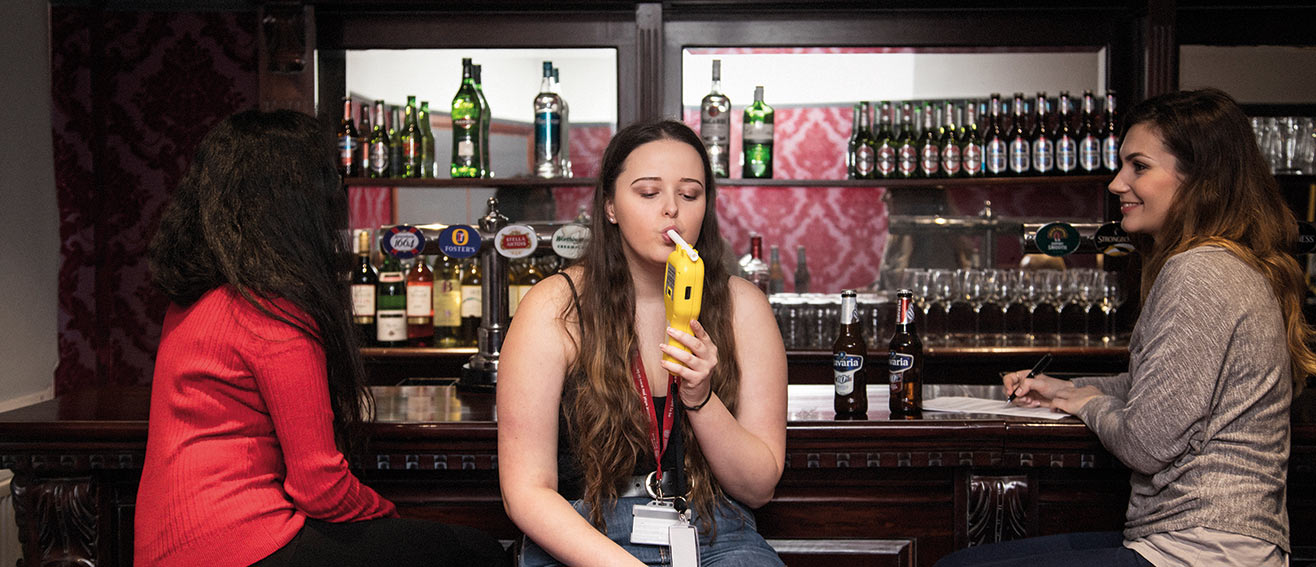
Psychology facilities - the 'Pub Lab'
Not many research teams would install a stocked bar for staff and students, but the Psychology Division's 'Pub Lab' is not quite what it seems at first glanceHealth problems caused by excessive drinking costs the NHS around £3 billion a year, and this £20,000 facility will help LSBU research that could dramatically reduce that figure. It gives Psychology students the chance to see if findings from traditional lab-based research can be replicated in a more realistic environment, as well as helping to create strategies that reduce actual or potential alcohol-related harm in students. This cutting-edge facility is fitted with cameras and microphones to help staff and students to investigate the motivations behind why people drink in the ways that they do
"We are trying to simulate the environment in which people typically find themselves drinking, but giving ourselves a greater level of control," says Dr Tony Moss, Psychology Lecturer at LSBU. "It's not the sort of research that can be easily conducted in a real pub, where there are too many other influences and a lack of experimental control."
The facility enables researchers to create different environments through the use of lighting, music and pre-recorded background chatter, which will help aid the Psychology Division's research in this area – which is already well recognised by leading experts and policy makers. "Much of our research isn't so much interested in the effects of alcohol once people are intoxicated, but trying to understand the factors that motivate people to drink in certain ways," says Dr Moss.
The 'Pub Lab' is just part of a refurbishment of the facilities within the Psychology Division, which is helping equip LSBU graduates with the research tools they need to really stand out from the crowd.
Observation room
The Psychology Division is also home to an observation room with a one-way mirror, which allows the whole room to be clearly seen from the observation area, ideal for research in areas such as developmental psychology (where the presence of the experimenter might influence a child's behaviour).
Eye tracking
The laboratory is currently home to a desk-mounted SR eye tracker and is soon to add a head-mounted portable unit . These can help to support a wide range of experiments, incorporating other physiological data from apparatus such as Bio-psychological recording equipment (Biopac).
The university currently has three Biopac base units, which allow researchers to collect data including impedance cardiography (ICG), electro dermal activity (EDA), electro myogram (EMG), skin conductance response (SCR), continuous blood pressure monitoring, electro cardiography (ECG), and respiratory rate, amongst others.
Psychometric tests
The Division currently carries around 1,500 different psychometric tests across a wide range of application areas including clinical assessment, personality, neuro-psychological testing, cognitive performance and diagnostic screening. It also has three dedicated psychology computer labs and a large number of testing cubicles all equipped with PCs running a range of experimental applications. These include: Super Lab, E-prime, Experiment builder, Nudist, The Observer, Acqknowledge, In vivo, SPSS, Cog Lab and MPlus.
Analysing results
To help analyse results, staff and students have access to SPSS, a powerful software package for the statistical analysis of data. It is used by market researchers, health researchers, companies that conduct surveys, the government, marketing organisation and academia, and is a powerful tool for students to have at their disposal.